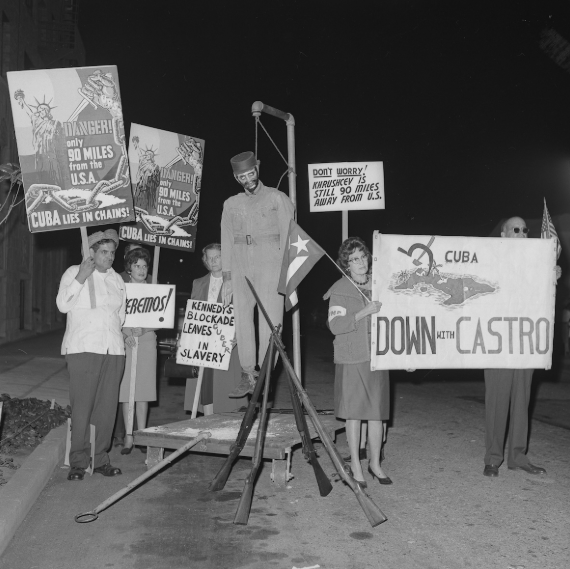Click Photo for See more

In 1963, Cuban exiles in Los Angeles organized a significant protest against the Castro regime, which was part of a broader effort by Cuban exiles to oppose Fidel Castro’s communist government after his rise to power in Cuba in 1959. The protest in Los Angeles, like many others across the United States, reflected the strong anti-Castro sentiment among Cuban expatriates who had fled Cuba to escape political repression, economic instability, and the rise of communism.
At the time, many Cuban exiles were deeply engaged in efforts to publicize the atrocities of the Castro regime and to garner support for the overthrow of Fidel Castro’s government. Protests, demonstrations, and rallies were common ways for exiles to express their dissatisfaction and rally support for Cuba’s liberation.
The protest in Los Angeles in 1963 likely took place at a key time in the Cold War, as the Cuban Missile Crisis had occurred only a year earlier in 1962. Tensions between the U.S. and Cuba were high, and the Cuban exile community was playing a pivotal role in pushing the U.S. government for more aggressive actions against Castro.
UCLA Library Special Collections houses important archival materials documenting this period, which include photographs, flyers, and news clippings that capture the sentiments and activities of the Cuban exile community in Los Angeles. The 1963 protest is among these significant moments in history when Cuban exiles made their voices heard in a city that became a major hub for the Cuban diaspora. The images and documents in the UCLA archives provide a vivid portrayal of the emotions, motivations, and struggles of these exiles, as they sought to challenge the Castro regime and advocate for a free Cuba.
These records are valuable in understanding not only the Cuban exile experience in the U.S. but also the broader geopolitical context of the Cold War and the ways in which diaspora communities became actively involved in shaping political discourse in their adopted countries. The UCLA Library Special Collections holds this material under a Creative Commons Attribution (CC BY 4.0) license, allowing for academic and public access to these historical resources.